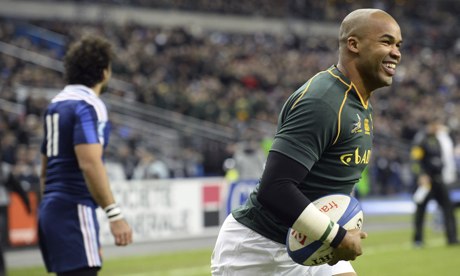
More misery for France but a nice long holiday for South Africa. The Springboks finish their tour of Europe unbeaten. This will not rank among the highlights of their season, an ugly, albeit ferocious affair, with balls and players slipping this way and that across a pitch that has become a disgrace for a stadium of this profile.
Quite apart from the implications for the quality of the match, there is a safety issue, with players losing their footing at the most vulnerable moments. It was a surface ill-befitting a Springbok side who finish the year in some credit as the second best in the world. Even if there is daylight between them and the All Blacks in first, there would seem to be a fair amount of the same between them and the rest as well.
It has been a miserable year for Les Bleus but rarely have things looked so shambolic as they did from the off here. Conceding a try on the stroke of the first minute did nothing to help matters, but these things happen.
The Stade de France turf, on the other hand, has successfully staked its claim to be the worst in international rugby, in the face of some ferocious competition. And one of its competitors, Murrayfield, is currently sick with infestation. We have not yet heard the explanation for the Stade de France's travails.
Morgan Parra would surely like to know. He could not seriously blame the turf for the first indignity he suffered, when, with South Africa having missed touch from a very early penalty, his clearance kick in the 55th second was charged down by JP Pietersen. The Springbok winger was able to trot on and in his own good time touch the ball down for France's latest nightmare.
At least Parra was soon afforded a chance to repair his reputation with a straightforward penalty, following a promising little dart by Wesley Fofana. He stepped up to take the kick, seemed to catch his non-kicking foot in the turf and spooned it wide.
The Springboks adapted better to the shifting sands beneath their feet, although they did not do much more than play their traditional game: kick it, chase it, wallop anyone who has it – hard – and swarm over the resultant wreckage. This surface could not have been further removed from those of the High Veldt so many of the Springboks have been brought up on, but it suited them more than the French, who persisted in swinging the ball from side to side. It was a policy that showcased the talents of the lively Brice Dulin, but otherwise made only the South African hard men look good.
And, as for the scrums, there has been too much written on those these last few years for them to bear further scrutiny here.
Suffice to say, the surface did nothing for the set piece's stability. At one scrum, the Springboks ploughed straight through France for a penalty, probably because they caught a rare patch of tenuousness in the sward. Nevertheless, it was a relief to have one reach a decisive conclusion.
That penalty and another at a driven lineout just before the break earned South Africa a 13-0 lead. They probably deserved it for their physicality but in truth no one was worthy of as many as 13 points.
Then suddenly, from the restart, France struck. It stemmed from a South African mistake, obviously, but Pascal Papé was quickly onto the loose ball, and Parra sent Yoann Huget into the corner and, would you believe, landed the conversion on the stroke of half-time.
It did not herald a renaissance however. The third quarter would remain scoreless.
South Africa came finger-tip close twice but were denied both times by the TMO. Neither was a thing of beauty. For the first Morne Steyn's fingertips were adjudged to have knocked on in the build-up to Jaque Fourie's claim (it was mighty close), then Yoann Huget somehow managed to get a fingernail to a loose ball before Francois Louw.
Steyn's third penalty on the hour stretched South Africa's lead to nine points, thus denying us even the compensation of a close scoreline. Thomas Domingo and Francois Louw, in that order, were shown yellow cards for foul play in the last quarter of an hour, and Louw's did yield France three points to bring things back to within a score. Pat Lambie's late penalty, though, reinstated the nine-point lead and denied us a dramatic conclusion. But it had been a game – and a pitch – that did not deserve one.

